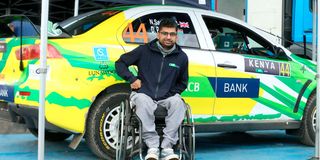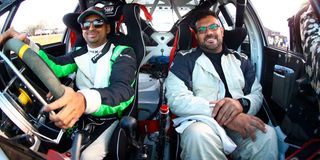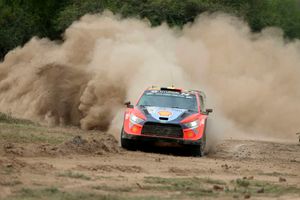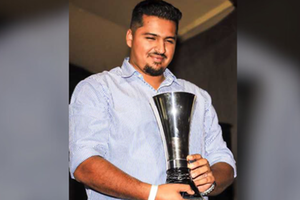
Nikhil Sachania beside his car on June 20, 2023 in Naivasha, before the start of the WRC Safari Rally.
The only paraplegic rally driver in the Kenyan scene currently, Nikhil Sachania, is preparing for his fifth consecutive WRC Safari Rally. He will be driving a Ford Fiesta Rally3 that has a modified steering system housing the brake, gear shift and accelerator levers.
Nation.Africa caught up with the 36-year-old speed lover who reveled why he loves the sport and what really drives him.
Q: Many wonder how you have been rallying all this years but let me first start by asking, how did you end up being on a wheelchair?
A: In 2011, I had a quad bike accident during a training rally. I got a spinal cord injury from the accident which left me paralysed from the waist down.
Q: What level of physical discomfort do you endure in three to four days of intense competition like in the WRC Safari Rally?
A: Normally it is my arms and hands that endure the most pain and discomfort. At the end of each long day I would get blisters on my fingers from using the hand controls the whole day. I would just tape them up in the evenings and get them ready for the next day.
Q: Motorsport thrills are dangerous but very addictive. In your case how addictive is it?
A: Motorsport is indeed filled with inherent dangers, but the thrill and adrenaline rush it provides can be incredibly addictive. For me, the addiction is undeniable. Despite the risks, the feeling of being behind the wheel, navigating challenging terrains, and pushing the limits of both machine and self is unparalleled. The sense of freedom and control I experience during a race is something I can’t easily give up. Motorsport is a testament to my resilience and determination to continue pursuing what I love regardless of the obstacles.
Q: Are you ever conscious that in case of an accident you will have to be assisted in leaving the car?
A: It is something that is always at the back of your mind. In such an extreme sport you know the risks that are associated with it. With my navigator by my side (Deep Patel), I know I am in safe hands in case of any issues. The marshals are also well trained in emergencies, so I normally like to keep my focus on the racing.
My journey into the world of rallying began at a young age, fuelled by a deep-seated love for speed and adventure. Growing up in Nairobi. My father, an avid motorsport enthusiast himself, played a significant role in nurturing this passion. His unwavering support and encouragement, combined with my own determination, led me to pursue rallying seriously.
Q: Can you share the technical details of your car?
A: My previous car, the Mitsubishi Lancer Evo X was acquired in Ireland, and we did the modifications here in Nairobi to suit my needs. The Disability and Accessibility Commission of the FIA then travelled to Kenya to inspect and homologate the hand controls. The hand controls are mainly on the steering wheel, there is a ring at the front of the steering wheel when it is pressed it controls the throttle. There is another ring behind the wheel which when pulled controls the braking system.

Nikhil Sachania navigated by Deep Patel in a Mitsubishi Evo 10 cruise through the Loldia Shakedown stage on April 1, 2022.
I also have a clutch system that I control with a lever. The rest of the controls such as the gear and the handbrake are the same. In the Ford Fiesta Rally 3, my current car, the engineers we have locally are more than capable of building and coming up with unique solutions for our problems. The team that we have onboard are very hands on and have a ton of experience.
Q: What is your mental level of preparation for Safari Rally and other Kenya National Rally Championship events?
A: Before and during the event we do try to keep a clear head and focus on the task at hand. Normally we try to get in early at night and hydrate well.
Q: How do you manage normal human beings' natural needs from eating to sleeping?
A: There are a few extra steps involved with my everyday life, but it's something that becomes second nature and blends into your daily routine. Simple tasks sometimes do require a bit more preparation than usual, but after a while it's normal.
Q: Please give us a glimpse of your normal day from dawn to sunset.
A: I am normally up by 6am and at the workshop at around 8am. I work at Samani Construction, a family business with my Dad. Depending on the day, I would make visits to our work sites, attend meetings, visit the garage or try to do some creative work. My work day usually ends at 5pm. In the evenings again depending on the day, I’d workout, do some physiotherapy, spend time with my dogs, catch up with friends or just chill out.
Q: Where do you expect to be in the next five years?
A: In the next five years, I aspire to make significant strides both personally and professionally. I aim to further develop my skills and expertise in engineering and construction, leading innovative projects at Samani Construction. On a personal level, my goal is to become more involved in the motorsport community, advocating for greater accessibility and inclusivity for drivers with disabilities.
Q: I know who are a driver. What drives you?
A: The driving force in my life besides God is undoubtedly my family. Their unwavering support, encouragement, and love have been instrumental in shaping who I am today. My parents have always been my role models, teaching me the values of hard work, perseverance, and compassion.
Q: What positive attributes can you share with sports people with lifelong disabilities like yours?
A: I think sports is a great outlet. Taking part in sports is a great way to show resilience and determination. I always admire the Paralympians on how they find unique ways to participate in the sport they love.
Q: Which challenges can you say gives you a bad feeling?
A: I don’t like stairs. However, it deeply saddens me to witness other human beings mistreating the physically challenged. Such actions stem from ignorance and a lack of empathy, and they perpetuate a cycle of discrimination and exclusion that we must strive to break. It is disheartening to see individuals being judged or marginalised based on their physical abilities, as it undermines their potential and worth. It is essential to foster a society that embraces differences and promotes inclusivity.
Q: You sound well read. Where did you go to school?
A: I did my GCSE and A Level in Nairobi at Premier Academy. For my university education, I studied Project management in the UK at Aston University. I live with my mum and dad. I am single.
Q: Are you searching?
A: Me. Maybe. Haha!











